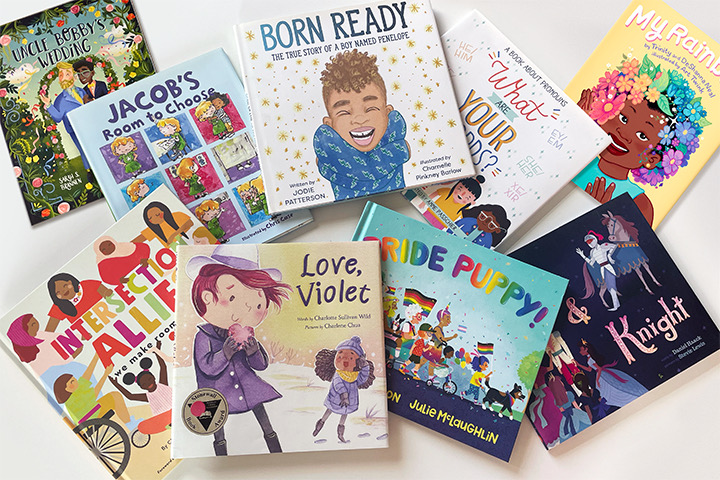The Ugly Stereotype Beneath the Supreme Court Ruling on LGBTQIA+ Books | Opinion
The nine picture books cited in Mahmoud v. Taylor are not pornography. Nor are they obscene. What is obscene is a Supreme Court decision that denies the basic humanity and equality of LGBTQIA+ people.
 |
| Photo by Melissa Joskow |
For four years, the movement to ban books that has swept through school boards and state legislatures often has relied on an ugly stereotype—the idea that all LGBTQIA+ stories and characters are inherently sexual in nature—to justify removing them from student access as “porn” or “obscene.”
Now the Supreme Court has shown its willingness to do the same. In a 6-3 decision in the case Mahmoud v. Taylor, the Court ruled on June 27 that a Maryland public school district could not use nine picture books with LGBTQIA+ characters and stories in classroom lessons— or “any other similar book is to be used in any way”—without first giving parents the chance to ‘opt’ their children out.
The decision will likely have an enormous chilling effect on public education, pressuring teachers and districts to avoid mention of LGBTQIA+ people altogether, just to circumvent the complications associated with administering such opt-outs. It is also an alarming bellwether for the long-term fight for LGBTQIA+ equality.
Animus toward LGBTQIA+ people has pervaded the case since its first filing. For one, the case’s basic premise was as much a question of discrimination as religious freedom, driven by parents who objected to their children encountering LGBTQIA+ books in schools, and sued to be guaranteed the “opt outs.” At oral arguments in April, Justice Neil Gorsuch reflected a view both offensive and discriminatory when he asked the school district’s lawyer: “You've included these [books] in the English language curriculum rather than the human sexuality curriculum to influence students, is that fair?"
The books in question feature children and families in all sorts of everyday situations, a parade and wedding, among them. But the justice’s question revealed a startling assumption, that children’s books about LGBTQIA+ people going about their day-to-day lives ought to be confined to the sexual education curriculum, rather than taught alongside any other children’s books about families or weddings or feelings. The proposition inherent in this question is clear: that a book with LGBTQIA+ characters or themes is inherently sexual.
We would not expect schools to put Alexander and the Terrible, Horrible, No Good, Very Bad Day in the sex education curriculum simply because it features a straight mom and dad. Why would Justice Gorsuch or others believe stories about families with two moms or two dads belong there?
It’s fair to say that the question rests on the antiquated stereotype that LGBTQIA+ people are, first and foremost, sexual beings and only secondarily people. Their very existence is, in fact, sexualized, even if a children’s picture book about LGBTQIA+ individuals or a family has no content of a sexual nature whatsoever.
Writing the Court’s opinion, Justice Samuel Alito made clear his disdain for these books’ availability in schools, when weighed alongside the plaintiff parents’ religious beliefs: “The storybooks present same-sex weddings as occasions for great celebration and suggest that the only rubric for determining whether a marriage is acceptable is whether the individuals concerned “love each other.”
What Alito ignored is that marriage equality is “acceptable” because it has been the law since 2015. A recent Gallup poll shows 70 percent of Americans support same-sex marriage. Children in elementary schools today have never known a country without marriage equality–a world before the Supreme Court’s Obergefell v. Hodges decision 10 years ago made same-sex marriage legal. Denigrating these books denies that reality.
Where does this decision leave children being raised by same-sex parents, or who may identify as LGBTQIA+ themselves? They may be left without ready access to books in schools that reflect their lives— the fact of marriage equality they have grown up with.
Beyond Maryland, the Court’s invocation of these cruel stereotypes to justify the restriction of literature does not occur in isolation. Since 2021, PEN America has tracked and reported on how censorship proponents have claimed that books like And Tango Makes Three, Everywhere Babies, The Family Book, or The Purim Superhero are sexually explicit, merely for including LGBTQIA+ identities. Of the over 10,000 instances of book bans in the last school year alone, 39 percent featured LGBTQIA+ characters and people.
These books are not pornography. Nor are they obscene.
What is obscene is a Supreme Court decision that denies the basic humanity and equality of LGBTQIA+ people.
For readers and educators in public schools, we must meet the moment and defend against these damaging stereotypes. We must continue to demand that public schools feature literature that is diverse, inclusive, and—most of all—reflects the country we have, where marriage equality is guaranteed and where hundreds of thousands of children grow up with two dads or two moms, and deserve to be treated fairly.
Jonathan Friedman, Ph.D, is the Sy Syms managing director of U.S. Free Expression programs at PEN America. Tasslyn Magnusson, Ph.D, is a senior advisor with PEN America’s Freedom to Read program.
RELATED
The job outlook in 2030: Librarians will be in demand
The job outlook in 2030: Librarians will be in demand
ALREADY A SUBSCRIBER? LOG IN
We are currently offering this content for free. Sign up now to activate your personal profile, where you can save articles for future viewing






Add Comment :-
Be the first reader to comment.
Comment Policy:
Comment should not be empty !!!